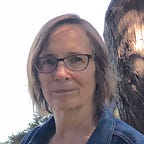Forgiveness: A Path Out of the Swamp
Part 4
My paternal grandmother was a light hearted and fun-loving woman. As a child, a visit with my grandmother was filled with giggles, games of tag, and the world’s best homemade Finnish rye bread. For years, I assumed that she must have had a wonderful childhood. I was wrong.
In the weeks leading up to her death, she told me a story that she had never shared before. She grew up in a triple in Worcester, Massachusetts. One of her chores was to wash the outside steps leading up the side of the building to their apartment on the third floor. One day her brother tromped up the stairs with his muddy shoes as she was washing the steps. She was angry with him and told him so. Her mother, who overheard the exchange, pulled her into the apartment and started beating her. I learned that this was not an uncommon event in her childhood, but it would be the last. She said that her mother was beating her as she kept screaming at her, “Cry or you’ll die, cry or you’ll die. ” On that day, my grandmother refused to give her mother the satisfaction of hearing her cry out. Luckily, her father came home from work early that day and stopped the beating. It was the last time her mother ever beat her.
There was not a trace of anger or bitterness in the retelling of this story; a story she had apparently never shared with her children. It wasn’t one of those stories that some people might shut away and pretend never happened, while it festers beneath the surface. Somewhere along the line, my grandmother let go of that story and forgave her mother. She didn’t become a victim, repeating the pattern of violence with her own nine children. (I’m sure she was tested, raising nine children during the depression era, while my grandfather was traveling looking for work.)
Perhaps this ability to forgive was passed down from my paternal grandmother, to my father, and then to me. Whatever the reason, I was able to forgive my mother for leaving me at my uncle’s house after she learned he was a child molester. (See Swampland of the Soul) I had to forgive my uncle knowing that he must have a lot of demons from his own childhood that would cause him to hurt an innocent child. It was easiest to forgive my aunt for not protecting me from her husband. I knew that life with this man must have changed her character from the competent young girl who took care of my mother when she was sick.
Early on, after the memories came flooding back, I was able to forgive these people for the part they played in an event that shook me to my core. A life changing event that filled me with shame, and kept me stuck in the swamp. However, it took me a long time to realize that the person that most needed forgiveness was myself.
Breaking the silence and sharing my story with people was an important and very difficult first step. Telling the story and not feeling the judgement that I felt toward myself reflected back to me was huge. I am extremely grateful to these people for their love and support.
At first it felt good to know that I wasn’t alone, that the same thing had happened to many other women. However, as time went on, I realized that when I retold my story, I felt the old hurt and anger wash over me. I was, once again, the small, powerless child in that dark room. I became wrapped up in my story. In some ways, I was defining myself by that story. Every time I went to that place, my body felt as if it was happening to me all over again. I believed that I was that dirty girl who was unworthy of love; a person who deserved to be in the swamp.
I know that thinking I was, in any part, responsible for the abuse is ridiculous. Intellectually, I know that it is absurd for a young child to think that they could have, or should have, been able to do something to prevent the abuse. Still, a part of me believed it to be true. A part of me believed that I could have stopped it. This was wrong information that I believed to be true. It created a lot of stress in my body, and was a powerful negative energy that kept me in the swamp.
Forgiving myself allowed me to clear the old wrong and negative information from my body. When I became aware that I needed to forgive myself, that I was actually worthy of this forgiveness, was when I began to feel love for myself.
Forgiving myself was a giant step toward getting out of the swamp, but it wasn’t enough.
To be continued…
With Love & Healing Energy by the Pond,
Laurel
